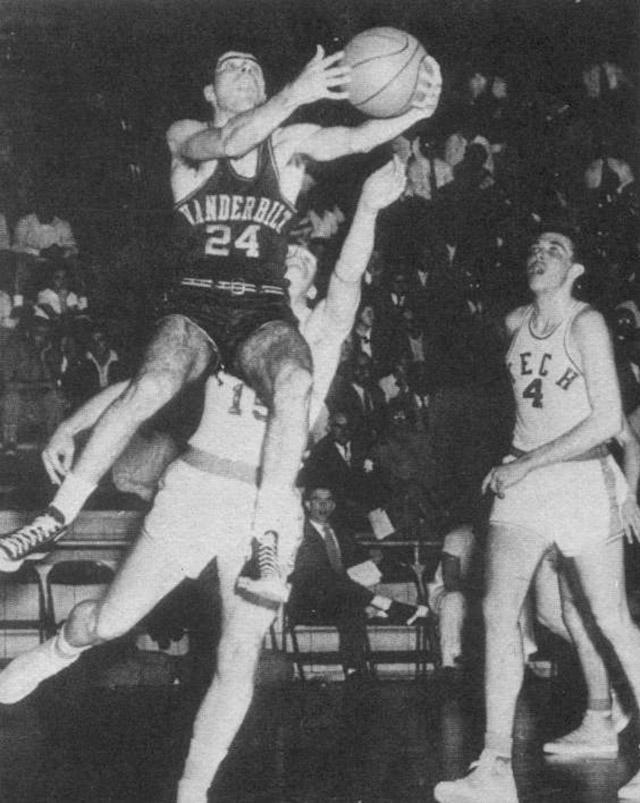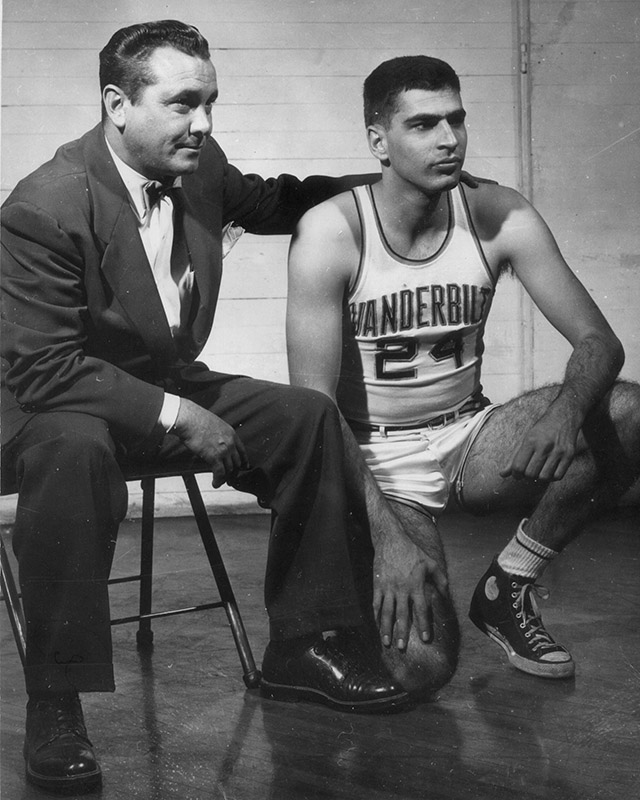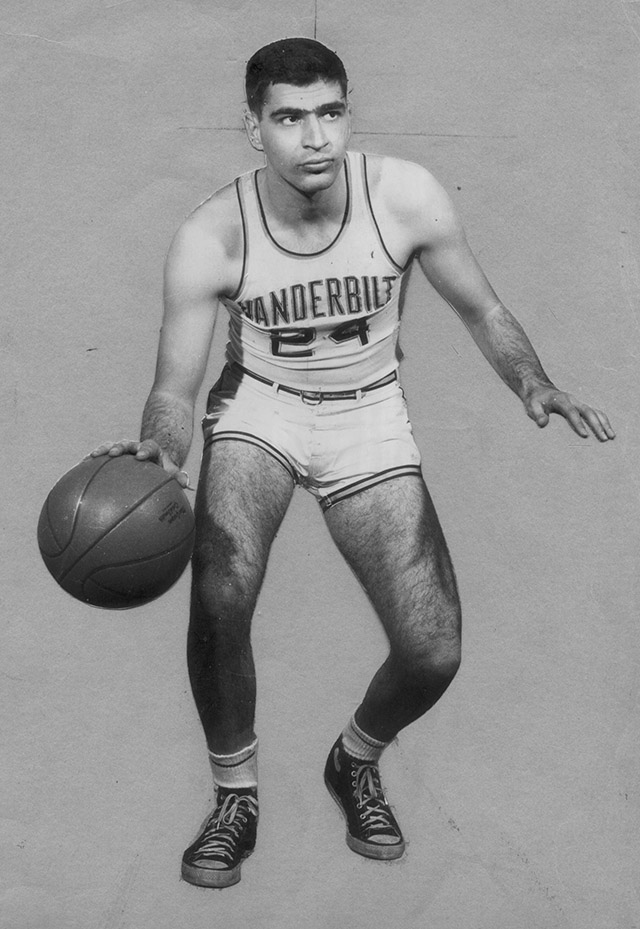Dec. 16, 2015

Commodore History Corner Archive
When Vanderbilt head basketball coach Bob Polk (1948-58, 1960-61) had five scholarships to offer, he dipped into the rich basketball tradition state of Indiana for three of those players. Those Hoosiers were Dave Kardokus (Evansville), Jack Heldman (Jasper) and Gene Southwood (Evansville). Joining that first full scholarship class were George McChesney (Middletown, Ohio) and Bob Smith (Nashville).
Kardokus (1950-52) would lead that historic class in scoring and rebounding all three years and to the Commodores first SEC Championship of any kind. Many years later, Polk said about Kardokus, “He was a superb ball-handler and great leaper. There wasn’t anything he couldn’t do and I felt he was possibly the most underrated high school player ever to come out of Indiana.”
Kardokus and the other incoming freshman were ineligible for varsity play in this era of college athletics. However, this talented youth gained the attention of Vanderbilt students drawing crowds at the Old Gym when the varsity scrimmaged the freshmen. Said Kardokus, “We beat the varsity all the time our freshman year. We had come to Vanderbilt to win and we didn’t know any better.”
Billy Joe Adcock (1948-50) was the varsity leader that became Vanderbilt’s first basketball scholarship recipient, first All-American, first 1,000-point scorer and first Commodore to make First Team All-SEC. In his final season Vanderbilt was 17-8 (SEC 11-3) good for second place. Adcock led that team in scoring (12.6 average) while sophomore Kardokus was second with a 10.1 average per game.
With Adcock’s departure Kardokus would enter his junior year with experienced players in Tennessee transfer and team captain George Kelley (1949-51) and Iowa transfer Al Weiss (1951-52), a powerful six-foot-four center. This would be a special season in Vanderbilt basketball history.
Vanderbilt had never won an SEC regular season championship or a SEC Tournament title until February 1951. The SEC was formed in 1932 and competition began the next fall. The Commodores finished the 1950-51 season in second place 15-8 (SEC 10-4) behind first place Kentucky that only lost once that season to St. Louis in overtime. The tournament was played in Louisville’s Jefferson Armory.
The previous time Vanderbilt played Kentucky in the tournament was 1947 when Adolph Rupp’s ‘Cats embarrassed the Commodores, 98-29. This shellacking was motivation for Vanderbilt to hire a full-time basketball coach, which was Polk. He brought Vanderbilt into the modern era of Commodore basketball.
Vanderbilt won the first tournament game over Tennessee (88-52) with scoring leaders Weiss (20), Kardokus (19), Kelley (12) and Heldman (10). Vanderbilt beat Georgia, 70-60, in the second round as Kardokus (17 points) pulled the Commodores together after Weiss, Kelley and Southwood fouled out of the game. A victory over LSU (75-63) put Vanderbilt in the finals against Kentucky ranked No. 1 in the country.

Coach Bob Polk with Dave Kardokus
In a 2000 interview Kardokus said, “We had a good team; we finished second in the conference two straight years, and in all honesty, we didn’t think we could beat Kentucky. They beat us twice during the season pretty handily, and we just thought they were too good.
“We thought we could win the other games since we split with Tennessee and beat Georgia. We didn’t play LSU in the regular season. Kentucky was the No. 1 seed, and they had to play three games, where we played four in three days.
“We played Thursday, Friday, Saturday morning and later that evening. So we were tired. I just didn’t think we could beat Kentucky, and I just didn’t want to be embarrassed.”
The Wildcats appeared invincible with seven-foot center Bill Spivey, Frank Ramsey and Cliff Hagan. Future Vanderbilt head basketball coach C.M. Newton was a substitute on that team.
The Wildcats had a 48-39 lead five minutes into the second half when Vanderbilt caught its second wind and Kentucky cooled off. Kardokus hit an outside jumper to pump up his teammates. Southwood would hit two set shots to give the Commodores a 51-50 lead. Kardokus and Spivey battled under the boards all night. Vanderbilt held on for a 61-57 win. Spivey led all scorers in the game with 21 points while Kardokus collected 13 for the Commodores.
“The only time I thought we were really going to win was when we were up by two points when Kelley hit two free throws to put us four points ahead,” said Kardokus. “That was the first time in the game I thought we could beat them. They were good. I mean good. They had Ramsey, Spivey and Hagan, who were three All-Americans. And they had Buddy Watson, who never missed.”
Kardokus led all scorers in the 1951 SEC Tournament with 64 points outscoring Spivey who totaled one less tally. Kentucky had won the previous seven successive SEC Tournaments and 12 all together. It was Vanderbilt’s first time in the finals of the SEC. The last Vanderbilt basketball championship was the 1927 Southern Conference Tournament crown in Atlanta.
Polk and his weary squad would go home without playing another game that season. Kentucky’s season continued as they won the NCAA National Tournament. For his effort, Kardokus was named First Team All-SEC Tournament and First Team All-SEC for the season.
Kardokus became the second Commodore to be named First Team All SEC. He was second in overall team scoring (11.1) for the 1950-51 season. Weiss led the team with a 13.6 average and named Second Team All-SEC and Second Team All-SEC Tournament.
“That was the time that the Madison Square Garden was the Mecca,” said Kardokus. “That was an NIT event, which was on par if not superior to the NCAA Tournament in prestige. Nobody wanted to go to the Garden anymore, and Bradley was hosting an on-campus tournament.
“We were invited to that, but we turned it down. We didn’t just say we weren’t going to any tournament. In those days, the NCAA was a 16-team tournament. You had to win the conference championship, and ironically, up until that year the tournament champions went. But they changed it that year to where the regular-season champion went. We weren’t invited to that or the NIT.”
The SEC Tournament was disbanded after the next season and revived for 1978-79. That 1951 SEC Tournament title would be the only one for Vanderbilt until 61 years later. Coach Kevin Stallings and his Commodores team defeated a No. 1 ranked Kentucky team in the 2012 SEC Tournament in New Orleans. That Wildcat team also continued its season with a NCAA National Tournament championship.
Those older Commodore teams had camaraderie that made an effort to enjoy the road trips while taking care of business preparing for a game and playing hard. Polk told his players, “Just don’t embarrass me. Do what you want to do, but be ready to play on Saturday and Monday.”

Teammate Dan Finch (1952-54) told this story about Kardokus on a senior year trip in Roy Neel’s 1975 book Dynamite! 75 Years of Vanderbilt Basketball:
“We were in New York playing St. John’s in the Garden and staying at the Roosevelt Hotel in Times Square. I’m in my room that afternoon and somebody knocks on the door. It was Kardokus, who bashed me with a pillow, feathers flying everywhere. Well, we had a hell of a pillow fight; Weiss, too – feathers everywhere.
“We get back from the game later and here’s Polk and a whole army of hotel managers waiting in the hall for us. We worked ’till midnight getting up those feathers. Although Polk had told us earlier to go on to bed, we knew he’d be out with [sportswriters] Waxo [Green] and [John] Bibb, so we took off for the Latin Quarter with about six bucks apiece…big spenders!
“After sitting through the show, we figure it’s time to leave, but we can’t find Kardokus, who by this time is in a dime dance parlor with some Latvian hostess. Of course, Kardokus is giving her some big line about being a big basketball star. Then she asks him, ‘what eez thees game – basket ball?’ Kardokus was ready to leave then. I think we made it back to the hotel just before Polk.”
Vanderbilt would conclude Kardokus’ senior year with another second-place finish 18-9 (SEC 9-5). Kardokus would be chosen Second Team All-SEC Tournament while playing in two games. He was also selected Second Team All-SEC for the season. Kardokus led his team in season scoring (11.8 average) while Heldman was second with a 10.9 average.
Kardokus led his class in career scoring with an 11.0 average in three seasons of varsity play. Heldman was second in that class with a career scoring average of 8.6 points per game. He would become an assistant under Polk for three seasons including as freshmen head coach.
Heldman and teammate Hank Duvier (1948-50) were one of the top guard combinations of Vanderbilt basketball to begin the 1950s. When Heldman left coaching for a business career a young Roy Skinner, and future Vanderbilt coaching legend, would replace him. (Go to Commodore History Corner archives for a 2013 interview with Heldman)
Kardokus passed away on September 6, 2014 at age 84. He served in the army after graduating from Vanderbilt and was a Korean War Veteran. Kardokus lived in Nashville and was in the banking business employed by First American Bank and retired from Third National Bank, now SunTrust Bank.
Traughber’s Tidbit: Stanford sophomore Christian McCaffrey of Stanford, the 2015 Heisman Trophy runner-up, is the nephew of Vanderbilt basketball All-American Billy McCaffrey (1993-94). He broke several of Stanford’s rushing records including the NCAA All-Purpose Yardage record with 3,496 yards passing Barry Sanders. Christian’s father, Ed, was an NFL receiver with the Giants (1991-93), 49ers (1994) and Denver (1995-2003). He also earned three Super Bowl rings with one Pro Bowl selection. Dave Sime, Christian’s grandfather, was a world class sprinter and won a silver medal in the 100 meters in the 1960 Olympics held in Rome.
Tidbit Two: When Vanderbilt head football coach and athletics director, Red Sanders, was considering candidates for the Commodores’ first full-time head basketball coach; Bob Polk (Georgia Tech assistant), Ted Hornback (Western Kentucky assistant) and John Wooden (Indiana State head coach and later of UCLA fame) were interviewed.
Hornback was hired in the spring of 1947. While conducting drills with his new Vanderbilt players, Western Kentucky’s coach Ed Diddle and the university’s president offered Hornback more incentives to return to Bowling Green. After a few weeks, Vanderbilt lost its first full-time coach before he coached a single game. Polk was then hired.
If you have any comments or questions, contact Bill Traughber via email WLTraughber@aol.com.


